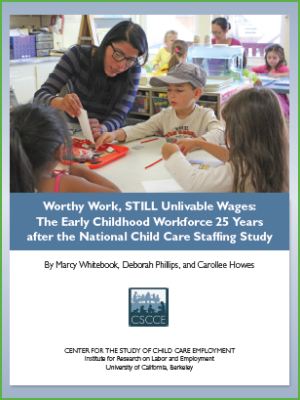
Worthy Work, STILL Unlivable Wages: The Early Childhood Workforce 25 Years after the National Child Care Staffing Study offers a snapshot of today's early childhood teachers in the United States. The report takes a look through four lenses:
- Then and Now: Trends in Wages, Education, and Turnover Among Early Childhood Teachers, 1989-2014. A comparison of available evidence reveals the extent of change in center-based teachers’ wages, education, and rates of turnover over the past quarter century.
- Economic Insecurity Among Early Childhood Teachers. New evidence reveals the serious consequences of inadequate compensation on this predominantly female, ethnically diverse workforce.
- The Public Costs of Inadequate Compensation. An examination of how widely early childhood workers and their families use public benefits offers a first look at some of the hidden costs of the low wages endemic to this workforce.
- Policy Efforts to Improve Early Childhood Teaching Jobs. An appraisal of state and national efforts to improve the quality of early care and education in the United States focuses on how adequately these have addressed the low wages of the teaching workforce.
The report also offers thoughts on paths forward and reinvigorating the national conversation on the status and working conditions of teaching staff.
Excerpt
"In the 25 years since the release of the National Child Care Staffing Study, combined developments in science, practice, and policy have dramatically shifted the context for discussions about the status of early childhood teaching jobs, and the importance of attracting and retaining a well-prepared workforce that is capable of nurturing young children’s learning, health and development. Three narrative elements of this changed early care and education landscape set the stage for the new evidence presented in this report:
- A developmental story. Since 1989, we have gained exponentially greater knowledge of the powerful role of children’s earliest encounters with caregiving adults in setting a sturdy or fragile foundation for lifelong development.
- An economic story. There is now a far more widespread appreciation for the wise investment that high-quality early care and education (ECE) constitutes for children, families, and society at large.
- A policy story. For the first time since 1971, when national child care legislation made it all the way to a presidential veto, there is serious debate at the federal level, echoed in virtually every state, about the vital importance of improving the quality of early education, with vast implications for what we expect of the early childhood teaching workforce."


